Part II:
Betty Boop's Evolution, 1931
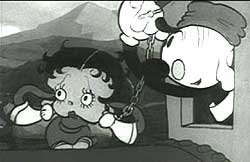 Biimbo gets top billing in & title role as The Bum Bandit (1931), the fourth film with Betty Boop. He's so rotten he even steals the fur off a squirrel. He sets out to rob a train having torn up a length of track. Betty Boop is on the train, still the early long-eared version of her. Biimbo gets top billing in & title role as The Bum Bandit (1931), the fourth film with Betty Boop. He's so rotten he even steals the fur off a squirrel. He sets out to rob a train having torn up a length of track. Betty Boop is on the train, still the early long-eared version of her.
She doesn't have the Helen Kane voice in this one, singing a half-spoken "Hold-up Rag" in a mature woman's voice instead of the bronxy little girl voice.
Despite that in this one Betty's not singing like Helen Kane, she is in fact singing a title that was one of Helen's signature songs, "Dangerous Nan McGrew." Unfortunately Betty has an inferior song of the same title & not the original.
Nan is a girl much tougher than Bimbo the Bandit. When Bimbo stops the train to rob it, Mickey Mouse can be spotted among the cowards. A mean-looking gunman intrudes to stop the robbery, but then throws off "his" disguise to reveal she's really Dangerous Nan McGrew. She bites off the tip of Bimbo's gun & spits bullets & smokes cigars. Bimbo realizes it's his wife by whom he had seventeen kids before he abandoned her & the kids years before.
Although she terrifies him, she forces him into the locomotive, out of which their underwear is tossed, leaving us no question as to how they had so many kids (being dogs it doesn't mean Nan was pregnant more than two or three times though, & they're working on the fourth in that locomotive).
A butch Betty as sexual initiatiator could've been great stuff, & the song could've been great, but this is quite a bad cartoon really, with a terrible alternative song about Nan McGrew.
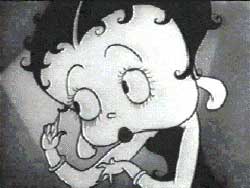 Bimbo has sole billing on the Talkertoons title card for Silly Scandals (1931), though there's nothing about scandals in the film & the title seems randomly applied.
Bimbo has sole billing on the Talkertoons title card for Silly Scandals (1931), though there's nothing about scandals in the film & the title seems randomly applied.
This is not the cute Bimbo. He has rather the manner of a little old tramp in bowler. He sneaks into a burlesque show where Betty headlines.
She sings in the Helen Kane manner the popular song "You're Driving Me Crazy." This is most definitely the jazz-age Betty, flapper in short-short skirt & revealed garter, despite that she still has the dangly ears.
Betty's accompanied by a line of dancers at the back of the stage who are boxy penguins of the most bizarre appearance, much the strangest things the episode presents, though they're given matter of factly.
In the audience Bimbo starts singing with her toward song's end, & like all the other guys at the burlesque house, he's in love with her. This would seem like the beginning of a relationship, the theme of many of the Betty-as-Bimbo's-girlfriend early episodes. However, when her song is through, so she leaves the stage & will not return for the rest of the cartoon.
A lion comes out to perform some magic. Bimbo laughs at the tricks which aren't supposed to be funny, so the angry magician gets a "volunteer from the audience" with the idea of getting even with Bimbo, soon hypnotized into ridiculous behavior, so that he too can sing "You're Driving Me Crazy."
It's a shorter than average episode & so ends abruptly. Betty was definitely the secondary character though by far the most appealing. It's a fairly decent little film.
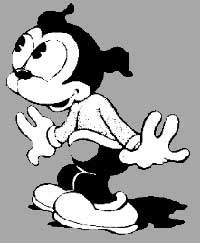 The Talkertoon title card for Bimbo's Express (1931) says "Bimbo & Betty in Bimbo's Express," Betty having second billing. Bimbo's introduced first in his horse-drawn Moving Van. Two workers, a hippo & a cat, ride in the back. The Talkertoon title card for Bimbo's Express (1931) says "Bimbo & Betty in Bimbo's Express," Betty having second billing. Bimbo's introduced first in his horse-drawn Moving Van. Two workers, a hippo & a cat, ride in the back.
Betty's clipping her toenails when the moving company arrives & Bimbo knocks on the door. She's a mite silly concentrating on her toes, but definitely a sexy Betty.
"I can't answer the door now! I'm in my nighty!" she calls through the door. Bimbo says, "All right, I'll wait until you take it off."
She still has the dangly ears but is otherwise the largely human Betty, in her full sensual glory. Bimbo is as yet still an appropriate boyfriend, not just her dog pal, so when Bimbo sets eyes on her, he's immediately in love & goes all goofy-giddy.
The hippo, cat, Bimbo the dog, & even the horse, load up the moving van with Betty's stuff. In a deep voice Bimbo sings "Hello beautiful. How'd you get so beautiful. How'd you get the sunshine in your smile." Betty sings back, "I'm not so beautiful. You only think I'm beautiful. You'll only think so for a while." When they finish their duet, Bimbo loads Betty onto the moving van, to move her around the corner.
There's no story to speak of & the moving gags are lowkey, but it's still somehow a pleasant cartoon, with that rather well done duet.
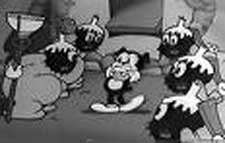 Bimbo, walking down the street, falls into a manhole into clutches of the the mystic order of goom gooma hotcha.
Bimbo, walking down the street, falls into a manhole into clutches of the the mystic order of goom gooma hotcha.
They're eager to instigate Bimbo's Initiation (1931) but he refuses to join. So they lock him up with numerous fearful surreal threatening events.
The fright fest stops periodically so the spooky goom gooma hotcha members can sing the query, "Wanna be a membah? Wanna be a membah?" to which Bimbo replies, "No!" then gets plopped into another horrific trap in the spooky world beneath the city.
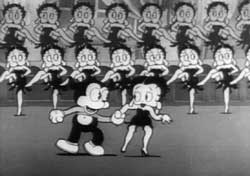 More than halfway through the film while Bimbo's still trapped, Betty Boop peers out of a door & says, "Come inside big boy!" More than halfway through the film while Bimbo's still trapped, Betty Boop peers out of a door & says, "Come inside big boy!"
She's still in her early incarnation with doggy ears, an appropriate girlfriend for Bimbo, so he can ogglingly excalim, "What a pippin!" But then he finds only more traps when he tries to go inside with the beauty.
Bimbo runs through more dangerous hallways & rooms & slips down slides. After he survives, Betty shows up one more time, does a hoochy dance while tugging on her long ears, & when she asks "Wanna be a membah wanna be membah" he exclaims "Yes!"
All the other Mystic Order members whip off their costumes & they all look exactly like Betty, forming a choras line behind her & Bimbo. Some imaginative surreal moments are imbedded in this one, but Betty is too freakish & still a minor character.
It's ninety-percent a Bimbo cartoon, & certainly his best, with a wonderful support role for Betty as well.
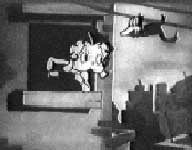 For Minding the Baby (1931), Betty Boop in her ninth outing finally has top billing over Bimbo for the opening credits, having come into her star status. But she still has doggy ears.
For Minding the Baby (1931), Betty Boop in her ninth outing finally has top billing over Bimbo for the opening credits, having come into her star status. But she still has doggy ears.
The title song is given behind the opening credits: "Minding the baby/ Walking the floor/ Stubbing your big toe/ Making it sore/ When he awakes/ The baby will bawl/ Oh, who wants a baby/ Cradle & all?" The song's awful & the operatic woman's voice singing it is worse.
Bimbo ihas to mind his baby brother Aloysius, a complete brat who whines for no reason, smokes cigars, plays the market, & is in general annoying.
Betty lives in the apartment across the alley, with views of each others windows. She sends a note over on the clothesline "Dear Bimbo - Ma is out. Come over. -Betty."
This puts Bimbo's in a bind, having to babysit, but a chance to be with Betty alone. When Bimbo can't come, Betty sings insinuatingly from the window, "Won't you come & play in my house? Don't you like me anymore? Papa's gone away to business. Moma's gone out to the store."
He finally crosses the clothesline to Betty's place & they play jumprope together, while the brat back home gets in trouble.
Betty & Bimbo's play is childish & it may take a few moments to realize they're both just kids, hard to realize because of Betty's apparently premature shapeliness. There had in fact been a discussion between the Fleischers & Paramount about Betty being too old (what, maybe twenty years old?).
So a couple of the cartoons make an effort to show that she's a kid still living with her parents (including in one of her truly great cartoons Minnie the Moocher though design-wise making her a kid involved only drawing her tinier, not less physically developed.
Minding the Baby's central gags involve the baby's use of a player piano (almost getting pulled into it on the retracting piano role) & a vacuum cleaner (almost getting sucked in that), which is about as interesting as it sounds. Betty's song is trivial. So overall this is only a so-so entry into the canon.
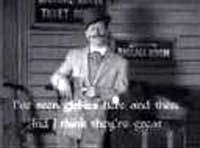 Betty in a bonnet (her ears not visible) is walking along the sidewalk loaded down with her pet cat, parrot, & umbrella as Kitty from Kansas City (1931) opens.
Betty in a bonnet (her ears not visible) is walking along the sidewalk loaded down with her pet cat, parrot, & umbrella as Kitty from Kansas City (1931) opens.
She arrives at the train station planning a trip to visit Rudy Valley (a Valley where Rudy Vallee lives, get it, get it, get it?). After a few standard cartoon gags mostly a rushing train, the train finally speeds by the station without stopping, grabbing Betty by the mail catcher & dropping her off at Rudy Vallee's place, having left her pets behind never to be considered again.
The film now cuts to live action of Rudy in a fake mustache singing the comical ragtime novelty song "Kitty from Kansas City: A Comedy Fox Trot." When he finishes, he starts over again with a Follow the Bouncing Ball lyric at the bottom of the screen, & concludes by ripping off his fake mustache.
Betty returns for a long finale, except this time she is enomrously fat! A horse dumps her in the ocean where she swims around & is befriended by sea creatures.
It's intriguing this episode consciously does not show Betty's ears but there's a moment early on when we see she has hassidim style curls sticking out of her bandana where the dangly ears & later the loop earrings should be. It's also intriguing they eating into obesity.
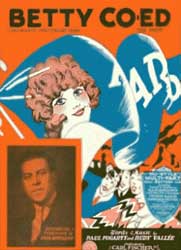 Rudy Vallee's 1930 hit song "Betty Co-ed" was not originally about Betty Boop & even spoke in the lyrics of her golden hair. She was otherwise the flapper type in college for flirtation sake rather than education.
Rudy Vallee's 1930 hit song "Betty Co-ed" was not originally about Betty Boop & even spoke in the lyrics of her golden hair. She was otherwise the flapper type in college for flirtation sake rather than education.
The following year after this was a big hit for Rudy, the Fleisher brothers made a "follow the bouncing ball" cartoon Betty Co-ed (1931), featuring a flapper not unlike Betty Boop though primitively drawn compared to Betty, though not really her. It was likely because of this bouncing ball song that Rudy's next bouncing ball tune for the Fleischers featured Betty as Kitty from Kansas City.
I've wondered if this was an experiment for revamping Betty as more oriented toward children, as she has a Bimbo-like boyfriend who isn't Bimbo also more primitive & child-oriented. Just about everything in this film could have been about Bimbo & Betty, & it's hard to comprehend why the Fleischers would make such a close approximation of both characters. The not-Bimbo's sweater has an "F" on it, standing for what, I dunno.
It begins Merry Melodies-like as sundry animals in the woods play a ragtime song. Doggy "F" has a few mild encounters then is deposited by a tree at the door of a frat house. "Betty," a girl with enormous feet, a flapper's bob, enters the frat house & begins giving spankings to fat boys.
Rudy Vallee then appears in live-action footage singing his hit "Betty Co-Ed." There's a Yale flag on the wall over his shoulder an an "M" on his letterman's sweater. After singing it through once, it goes again with Follow the Bouncing Ball lyrics on the screen, below animation of sundry animal college boys who love Betty Co-ed.
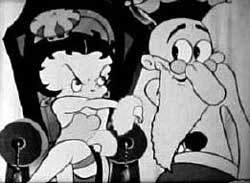 Mask-a-Raid (1931) is Betty's eleventh film. It begins with Betty strolling with jaunty gait into the masquerade ball wearing a black mask, queen's crown, & long train held by two mice followed by her personal entourage. We're about to be treated to something fun.
Mask-a-Raid (1931) is Betty's eleventh film. It begins with Betty strolling with jaunty gait into the masquerade ball wearing a black mask, queen's crown, & long train held by two mice followed by her personal entourage. We're about to be treated to something fun.
Betty's reliably getting top billing over Bimbo, who we glimpse after Betty's introduction, the ball's band leader. Like Betty herself, Bimbo has gone through changes in the first two years of cartoons, but he's finally settling down into the short cute Bimbo.
Betty now has earrings instead of the long ears & is fully human, but she still flirts with the dog, & not until Boop-opp-a-doop (1932) will her human nature completely eradicate her origins as a girlfriend for Bimbo.
Removing her mask she makes eyes at Bimbo, who is completely won over with his "Oh, baby!" & a view of his heart attached to a bicycle pump.
When Betty's seated, a horny old man starts tickling her with the tip of his long white beard, saying, "Poppa's daisy!" which annoys Betty so much that she cuts off his beard.
Bimbo puts on an Italian mask & sings a silly song with the dirty old man, but his real face turns around to look at Betty's gams. The novelty song is splendid, though you've got to know the Delaware Lackawanna is a railroad line for it to make any sense.
No one really knows who the singer was for Bimbo. A learned guess in the Heptune Guide to Betty Boop is that it is Harry Reser's Six Jumping Jacks with drummer Tom Stacks singing the lead. It all has a Louis Prima type of bounce to it that's quite a joy.
Betty & Bimbo prominade together. The dirty old man won't stop trying to get her. Betty sings a flapper song encouraging them to fight it out for her. Despite that she obviously prefers Bimbo, she isn't deploring the dirty old man as much as she should, loose gal that she can be. She sings to both of them, "You're the one that I care for. And you are too."
They have a duel of swords, Bimbo's sword a third the length of the old man's. Without any reason all the other costumers at the ball begin duelling & for some reason most of them are in medieval court costumes & knights' armor. In fact the whole idea of a masquerade seems to have given way to the idea of the old man being an actual king, this a castle, & he's about to have Bimbo thrown in the dungeon.
One of the stronger knights turns out to be Betty in armor. She snatches Bimbo to safety & asks, "What would say if I married you?" And he sings an additional version to his Italianesque novelty song, this time with nonsense-lyrics Italian song, "Alla-bompala-boomp-a-dee!" At the very end Bimbo morphs into a human, almost certainly a caricature of someone very famous in New York entertainment circles in 1931, but whose identity now seems lost to time!
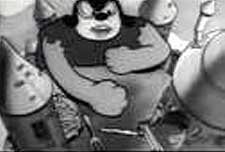 Betty gets top billing in Jack & the Beanstalk because she was the bigger star by the latter part of 1931, but second-billed Bimbo plays the title role & has the larger amount of screen time. Bimbo has reverted to the un-cute white-faced Bimbo in this one. Sexy Betty still has doggy ears.
Betty gets top billing in Jack & the Beanstalk because she was the bigger star by the latter part of 1931, but second-billed Bimbo plays the title role & has the larger amount of screen time. Bimbo has reverted to the un-cute white-faced Bimbo in this one. Sexy Betty still has doggy ears.
Several clouds have nice houses built on them. A cigar-smokin' giant naps on his cloud, too much of a giant to fit inside his castle. He stretches & yawns & drops the stub of his El Jumbo stogie to earth. It lands in Bimbo's barn.
The stub was so enormous it broke the roof of the barn & injured Bimbo/Jack's cow. Jack looks through a spyglass & sees the culprit asleep on his cloud, & Jack wants to get even. "How to get up there?" wonders Jack. The cow says, "Use your bean."
Jack has a can of magic beans under his hat. He plants them & rides a sprout to the cloud, singing, "I'll plant so high I'll reach the sky & never come back till I get that guy."
Passing other cloud estates, he finally reaches the giant's cloud, while the giant's busy eating spaghetti. The giant's diminutive cook is Betty Boop, who is enslaved in the giant's kitchen, splitting giant peas, but not afraid to talk back to the grouchy giant.
Bimbo decides he'll be the gallant knight & helps Betty. He ties up the giant with ease. A giant plucked chicken is the magic hen, which they ride back to the earth. The giant's cloud is lowering so he can reach them, but the hen lays four eggs which turn into wheels & Betty & Bimbo escape on their giant chicken-vehicle, already planning their marriage.
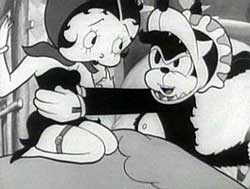 Betty stars as Dizzy Red Riding Hood (1931, the year's final Betty episode in theaters in December), her ears aren't even visible most of the cartoon, hidden under the hood. Though she seems to have made the full transition to human being, she is still enamored of dogs, & would still be attracted to Bimbo in the January release Any Rags (1932), for which reason it is usually assumed her fullest humanity begins with 1932's second outing in Boop-oop-a-doop.
Betty stars as Dizzy Red Riding Hood (1931, the year's final Betty episode in theaters in December), her ears aren't even visible most of the cartoon, hidden under the hood. Though she seems to have made the full transition to human being, she is still enamored of dogs, & would still be attracted to Bimbo in the January release Any Rags (1932), for which reason it is usually assumed her fullest humanity begins with 1932's second outing in Boop-oop-a-doop.
Dizzy Red packs a basket with fish & starts off through the woods to grandma's house. She tells Bimbo not to come, but he follows her anyway.
Bimbo & even the sentient trees warn her there's a wolf, but Betty's unafraid. She & a little frog skip along the forest path, Bimbo secretly following along at some distance.
The wolf begins skipping along with Dizzy Red. She pretends not to notice him. He sings a song about turning her into balogne, which Bimbo overhears & attacks the wolf, skinning it alive.
Bimbo is convinced Dizzy Red has the hots for wolves rather than doggies, so puts on the wolf skin to follow after her. She's picking flowers as she goes along, singing about each one. Her famous garter falls off & follows along after like a wormy pet. Bimbo in the wolf's fear hurries to Grandma's house. Grandma is gone to the fireman's ball so Bimbo disguises himself as her in the bed, then leaps up at her in the wolf skin.
Red sings a jazzy song, "Where'd you get those eyes, Granny" before Bimbo pops out of the wolf skin & they begin kissing & spooning in bed. She starts out scared but slowly melts into Bimbo's embrace.
This risque conclusion would not have been possible after the Production Code of 1934, & much else about the episode would not have made it past censors.
Very likely the brutal flaying of the wolf would also have been prohibited as too violent. Betty's legs are naked to within millimeters of her crotch, & at one point even her skimpy garment is flying off in the woods until the helpful tree pulls it back on her. There's even a homosexual character encountered in a quick bit, mincing about helping Betty pick flowers, & he'll be another taboo figure post-Code.
copyright © by Paghat the Ratgirl
|
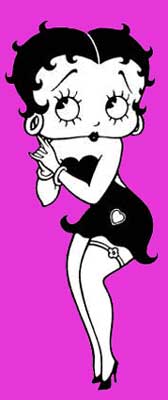




 More than halfway through the film while Bimbo's still trapped, Betty Boop peers out of a door & says, "Come inside big boy!"
More than halfway through the film while Bimbo's still trapped, Betty Boop peers out of a door & says, "Come inside big boy!"




